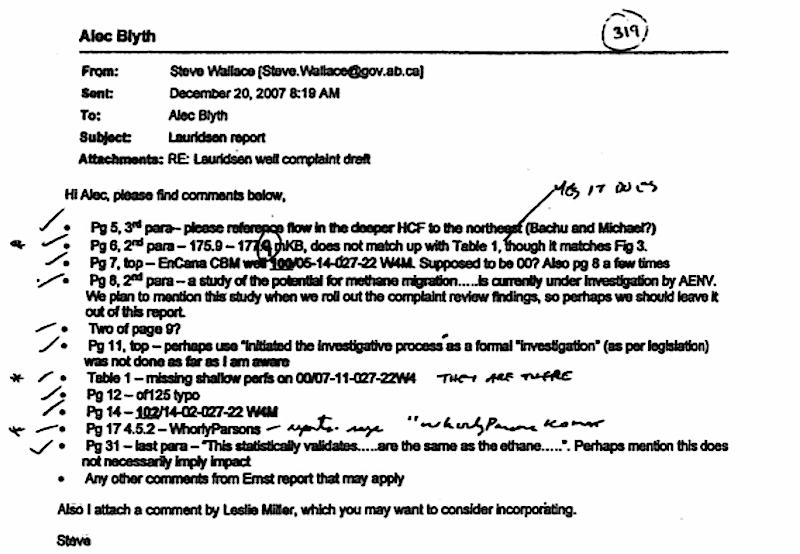By Roy L Hales

During the thirty years prior to the lawsuit, Ernst was a consultant working in the oil and gas sector. She performed like environmental impact assessments, environmental protection plans and recommended mitigation. Encana was one of her customers. Jessica Ernst doesn’t get paid work anymore. Seven years ago she sued against Encana, Alberta Environment and the Energy Resources Conservation Board (ERCB). The case has yet to go beyond the question of whether an Albertan citizen can sue government agencies. When Judge Neil Whittmann ruled the case can proceed, last November, he said (paragraph 56) “there is a reasonable prospect Ernst will succeed in establishing that Alberta owed her a primae facie duty of care.” Did Albertan regulators act in bad faith?
Above the Law And Canada’s Charter
The ERCB’s defence is that their actions are above the law and Canada’s Charter of Rights and Freedoms. In their application for leave to appeal, of December 5, the Energy Board stated Ernst “might have a valid claim for damages against the other defendants,” but not the ERCB. They cited section 43 of the Energy Resources Conservation Act: “No Action or proceeding may be brought against the Board or a member of the Board or a person referred to in section 10 or 17(1) in respect of any act or thing done purportedly in pursuit of this Act, or any Act that the Board administers, the regulations under any of those Acts or a decision, order or direction of the Board.”
Ms Ernst claims Alberta Environment’s investigation has had all the elements of “bad faith” from the beginning. They were slow to investigate complaints lodged by Ernst and her neighbours. Though tests showed that well water is contaminated, the investigator did not test any of Encana’s shallow coal bed methane wells (paragraph 18), “including 60 in the area that were drilled less than 200m below the surface.” Ernst alleges that the investigator used “unsterilized equipment” and during the investigation data was “lost, destroyed or otherwise disposed of.” Furthermore, Alberta Environment failed to obtain a list of the chemicals Encana was using so that it would be possible to verify if they were also found in Ernst’s well.

Through freedom of information, Ernst obtained evidences like the emails above to substantiate her claim that government regulators staged a cover up. An Alberta Environment employee, Steve Wallace, appears to have edited a supposedly “independent report” being cited as evidence.
“The notion of immunizing governments from judicial scrutiny is particularly suspect when the claim is made pursuant to the Charter,” Ernst’s lawyer responded in paragraph 15 of their January 18, 2015, reply to the Supreme Court of Canada. “Indeed the very purpose of the charter is to restrain government action and to provide citizens with a court to obtain remedy when those actions are breached. Courts are given a special role as the guarantors of the Charter and overseers of our constitutional system; this role cannot be usurped by an immunity provision purporting to completely shield government from judicial scrutiny for Charter breaches.”
Origins of The Dispute
Though this suit began seven years ago, it has still not proceeded beyond preliminary applications. The origins of the dispute go back further, to 2001.
Ernst says Encana Corporation did not send out any notification before it started working in the Rosebud, Alberta. She was away on business trips for months at a time and didn’t even know they were fracking in her area.
Her initial concerns arose from:
“ … an incredible increase in industrial noise. It sounded like a jet taking off 24 hours, seven days a week. It disrupted sleep. I became more and more annoyed and irritated, but I didn’t even know where all the noise was all coming from! I’d want to go outside and do my usual gardening chores or pruning trees, but the noise would drive me in all the time. And I also began to notice more and more and more big industrial lights on the landscape at night, because one of the things I love about living in rural Canada is the dark and quiet. Both the things I love were being disrupted. I also love songbirds and I noticed the songbirds vanished. They were driven out by the noise.”
She did not immediately associate this with her “plumbing” problems. Her “water taps began to whistle like a train coming, very loud.” Ernst’s dog began pacing through the night. She received “terribly caustic burns” after bathing.
They’ve Done Nothing But Lie To Me

“Encana had a contract with me and they’ve done nothing but lie to me,” said Jessica Ernst.
The fossil fuel giant denies this, of course. In their statement of defence, paragraphs 5&6, Encana claims to have “complied with or exceeded the requirements of all relevant laws, directives and regulations in respect of its coal bed methane (“CBM”) exploration, drilling, stimulation, and production operations in and around the Ernest Property (“the Operations”), and took took all necessary precautions to protect the Ernst Property and Ernst Well.” The “natural gas or related substances” found in her well “occurred naturally or by other causes.”
Ernst was still not aware of the potential danger when an agent requested access through her property. They wanted to work on a neighbour’s land “and he needed the money.” The agent said there would never be more than one well per section of land (360 acres).
“We now have about 20 wells per section and most of those are fractured,” she added. “Encana didn’t just do their experimental shallow fracturing, they fractured right into our drinking water supply. On about 200 gas wells Encana fractured above the basic groundwater protection where the fresh drinking water supply is and they didn’t tell any of us.”
Not long after Encana started fracking, Rosebud’s concrete reservoir exploded. The water manager was seriously injured and hospitalized. Ernst said there were reports of concrete flying hundreds of meters. At first, everyone believed the cause was a propane torch.
Ernst changed her mind after reading “An accumulation of gases caused the explosion and the water manager couldn’t smell anything.” If it had been a propane torch he would have smelled the propane, but natural gas does not have an odor. The rotten egg smell associated with it is mercaptan, which is added so that people will know if there are leaks.
Encana Fractured Our Acquifers
“Encana fractured our acquifers in 2004,” said Ernst.
The fossil fuel giant denied this in their defence, stating (paragraph 15) “ … both Encana wells were stimulated, but neither was hydraulically fractured.”

Ernst obtained the well record you see above through freedom of information. Note the entry for March 2, 2004, which clearly says “Fractured.”
Still Do Not Know What Chemicals
“Now, ten years later I still do not know what chemicals Encana experimented with here,” said Ernst. “We do not know the drilling chemical additives, which can be very toxic. We do not know what fracked additives or whether they gelled their fluids with diesel, which they often do. None of the regulators, none of the provincial regulators, the Alberta Energy Regulator, Alberta Environment, Health Canada, nobody Federally will compel Encana to tell us what chemicals were injected. So how do you properly test your water well if you don’t know chemicals to test for?”
Ernst cannot use the water from her well. The government initially provided water deliveries. Ernst suspects this stopped because Encana complained that it made them look guilty.
She has to drive 45 minutes to obtain water, which is difficult when temperatures stay below zero during the winter months. The roads are “very slippery and dangerous,” so Ernst is waiting until Spring. She installed a 900 gallon tank in her laundry room. Now Ernst washes her dishes once a week and full baths have become rare luxuries.
“The experts at the University of Alberta have found that the fingerprints of the ethane in my water match Encana’s, but that took me years to discover by a freedom of information. The government tried really hard to prevent me from getting that information,” said Ernst. “They covered up for Encana.”
Duty Of Care For Albertan Citizens
Ernst’s suit against the government rests upon the claim it failed to fulfil its Duty of Care for Albertan citizens.
Crown counsel argued that if this Ms Ernst succeeds, her suit could open the way for similar cases, “There could be millions or billions of dollars worth of damages!”
In his ruling, Judge Whittmann responded (paragraph 54), “a finding that there is a duty of care does not necessarily lead to liability – there must be a breach of that duty and the breach must cause the damage complained of.”
“If the Supreme Court says no to our appeal, that will be used as legal precedent for a regulator to violate the rights of any Canadian,” said Ernst. “I believe that to frack us all n Canada, and they do want to frack everywhere, they have to destroy our Charter rights because rights that protect us interfere with their bottom line.”
She claims to have obtained 10,000 pages of evidence, but it may be years before the case is decided. Seven years have already been consumed by preliminary applications.
Questions remain:
- Are the actions of government agencies, like Energy Resources Conservation Board, above the law and Charter of Rights and Freedoms?
- Whose interests is the Alberta government meant to serve: the citizens of Alberta? Or corporate interests?
- Does the government of Alberta owe its citizens a duty of care?
- If the government of Alberta does owe its citizens a duty of care, can Jessica Ernst prove government agencies violated this duty and conspired with Encana to conceal the facts?
- What is behind Crown Counsel’s assertion that if this case has the potential to make the Albertan government liable for millions of dollars, possibly even billions of dollars, in damage claims?
- If Ms Ernst’s suit is successful, what effect will it have for similar complaints in other parts of Canada?
- Will this case ever be decided?
- Did Albertan regulators act in bad faith?



Just heard Jessica’s interview with CBC…You are one Brave Woman!!! From the bottom of my heart…. Thank you for standing up against impossible odds!